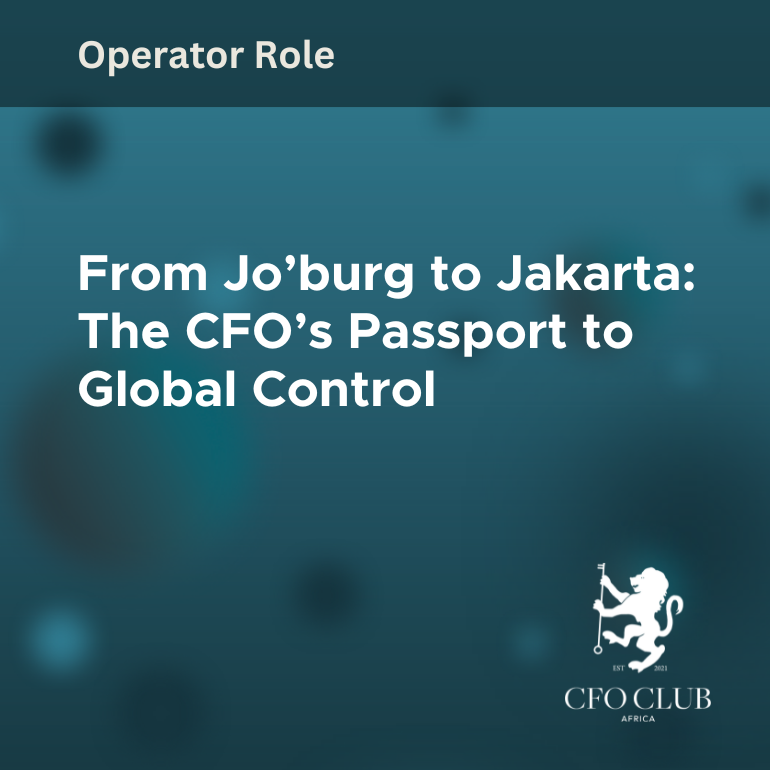From Jo’burg to Jakarta: The CFO’s Passport to Global Control
From Jo’burg to Jakarta: The CFO’s Passport to Global Control
Your board decides to expand into another country. The CEO announces growth into Africa or Europe. Everyone’s excited. But in the back of your mind, you know the hard work starts now, because you, as CFO, are the one who must bring order to financial chaos in a world that speaks many accounting languages, follows different rules, and operates on different calendars.
Welcome to cross-border CFOing. It’s complex, risky, and demanding. But it also positions you at the centre of strategic growth.
The CFO’s Expanded Role
Modern CFOs are no longer just financial stewards; they are architects of global finance strategy. When a company expands internationally, the CFO becomes the translator between local realities and group-level goals.
But let’s be clear: operating in multiple jurisdictions is not just about conversion rates and spreadsheets. It’s about governance, compliance, control, cash flow, and risk, at scale.
What to Consider Before Crossing the Border
If your business is planning to expand internationally or already operates in multiple regions, here are critical areas that require your attention:
1. Regulatory Environment
Every country has its own legal and tax framework. Before setting up shop, understand:
- Which financial reporting standards apply (e.g. IFRS, local GAAP)?
- Are there statutory audit requirements?
- What are the filing deadlines, documentation standards, and audit tolerances?
- Do local tax laws align with international tax principles like OECD’s BEPS framework?
You cannot assume that what works in your home country will work elsewhere. A delay in VAT registration or an incorrect payroll tax deduction could lead to fines, reputational damage, or even forced closure.
2. Entity Structure and Tax Planning
You need to determine the best structure for expansion: branch, subsidiary, joint venture, or holding company. Each comes with different tax, legal, and operational implications.
Also consider:
- Where profits will be taxed
- Whether foreign tax credits apply
- Withholding taxes on dividends, royalties, and interest
- Double taxation agreements
- Transfer pricing documentation and intercompany agreements
Work with local tax advisors and international legal counsel early in the process. Trying to fix a poor structure later is expensive, time-consuming, and often public.
3. Cash Flow and Currency Risk
Cash doesn’t move freely across all borders. Some jurisdictions have exchange control regulations, while others make repatriation costly or slow.
Monitor:
- Foreign exchange rate fluctuations and their impact on your bottom line
- Restrictions on profit repatriation or dividend declarations
- Bank regulations, local banking practices, and funding availability
- Intercompany loan structures and interest rates
A sound treasury strategy should include cash flow forecasting per country, central vs. local banking decisions, and foreign exchange risk management tools.
4. Technology and Data Integration
Your finance systems must support multi-entity, multi-currency, and multi-GAAP reporting. Manual workarounds won’t scale and can lead to serious reporting errors.
Invest in:
- A cloud-based ERP that supports local compliance rules and global consolidation
- Automation for tax calculations, intercompany eliminations, and reporting
- Cybersecurity controls to meet different data protection laws (like GDPR or POPIA)
When data lives in silos or spreadsheets, group consolidation becomes slow, inaccurate, and risky.
5. Local Team and Cultural Understanding
Each market has its own business etiquette, work culture, and pace. Hiring local finance professionals can provide invaluable insights, but they need to be aligned with group policies and controls.
Focus on:
- Creating clear group-level policies that apply across all regions
- Training local staff on reporting timelines, controls, and expectations
- Understanding cultural norms around contracts, invoicing, and debt collection
- Bridging language and time zone differences in global meetings and approvals
A strong, trusted local finance lead can make or break your cross-border operation.
What to Look Out For
- Ignoring local tax advice. This can lead to penalties, unexpected liabilities, or double taxation.
- Delays in compliance. Late registrations, incorrect filings, and misunderstanding regulatory obligations lead to regulatory scrutiny.
- Loose internal controls. Decentralised operations without oversight increase the risk of fraud or errors.
- Overcentralisation. Trying to run everything from head office without local input often leads to inefficiencies and resentment.
- Assuming one-size-fits-all. What works in one country may not be legal, practical, or culturally acceptable in another.
Risks and Rewards
Risks
- Penalties from tax authorities
- Compliance failures and reputational damage
- Audit qualifications due to poor controls or unsupported balances
- Currency losses and working capital inefficiencies
- Leadership fatigue and stress from managing complex systems
Rewards
- Access to new revenue streams and customer bases
- Diversified risk across regions and economies
- Potential tax optimisation through proper structuring
- Growth in shareholder value and investor confidence
- The evolution of the CFO role from financial controller to global strategist
How to expand your playing field Effectively
1. Plan meticulously before entering a new market. Never assume. Do thorough due diligence on laws, taxes, culture, and logistics.
2. Build relationships with local experts. Lawyers, tax specialists, and auditors in each country are your lifeline.
3. Standardise your finance policies and controls across all regions. But allow enough flexibility for local compliance.
4. Set up a robust communication and reporting cadence. Ensure local teams know when, what, and how to report.
5. Conduct regular internal reviews. Don’t wait for external audits to uncover issues. Proactive reviews save money and credibility.
6. Continuously educate yourself and your team. Global tax rules, reporting standards, and regulatory requirements are changing rapidly.
Final Thoughts
Cross-border CFO’ing is a challenge, but one that’s increasingly part of a CFO’s reality. It’s not about being perfect in every country. It’s about designing systems that ensure compliance, enable timely decisions, and empower your teams across regions.
If you manage it well, you unlock enormous value for your business and become the strategic anchor that holds global operations together.
In a world where business knows no borders, your leadership as CFO must stretch beyond local horizons. Your influence, your expertise, and your judgment are needed now more than ever, across time zones, tax regimes and cultures. That’s what makes cross-border CFOing not just important but indispensable.





